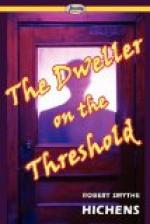“What do you mean by that? What do you claim?”
“You read that sermon?”
“I did.”
“Don’t you understand? I am that man at the window. He did not flee away. He could not. He was, he is, compelled to remain. He watches that dreadful life. And the other within the room is fading. The strength, the authority, the power, are coming to me. Every sitting broadens that bridge across which the deserters are passing. When I preached that sermon my congregation sat as if numbed by terror. And he in the choir listened, never moving. I saw his spirit, dazed, stretching out to grasp the truth, slipping back powerless to do it. It was like a thing moving through the gloom of deep waters—of deep, deep waters.”
Again Chichester’s voice died away. In the silence that followed the professor heard the faint ticking of a clock. He had not noticed it before. He could not tell now whether it came from within the room or from the room behind the folding-doors. It seemed to him as if this ticking destroyed his power to think clearly, as if it threw his brain into an unwonted confusion which made him feel strangely powerless. He was aware of a great uneasiness approaching, if not actually amounting to fear. This uneasiness made him long for light. Yet he knew that he dreaded light; for he was aware of an almost unconquerable reluctance to look upon the face of his companion. Beset by conflicting desires, therefore, and the prey of unwonted emotion, he sat like one paralyzed, listening always to the faint ticking of the clock, and striving to reduce what was almost like chaos to order in his brain.
“Why have you selected me to be the hearer of this—this very extraordinary statement?” he forced himself at length to say prosaically. The sound of his own dry voice somewhat reassured him, and he added: “Though there is nothing very extraordinary in the facts you have related. Telepathic communication between one mind and another is a commonplace of to-day, an old story. Every one of course accepts it as possible. What novelty do you claim to present to startle science?”




